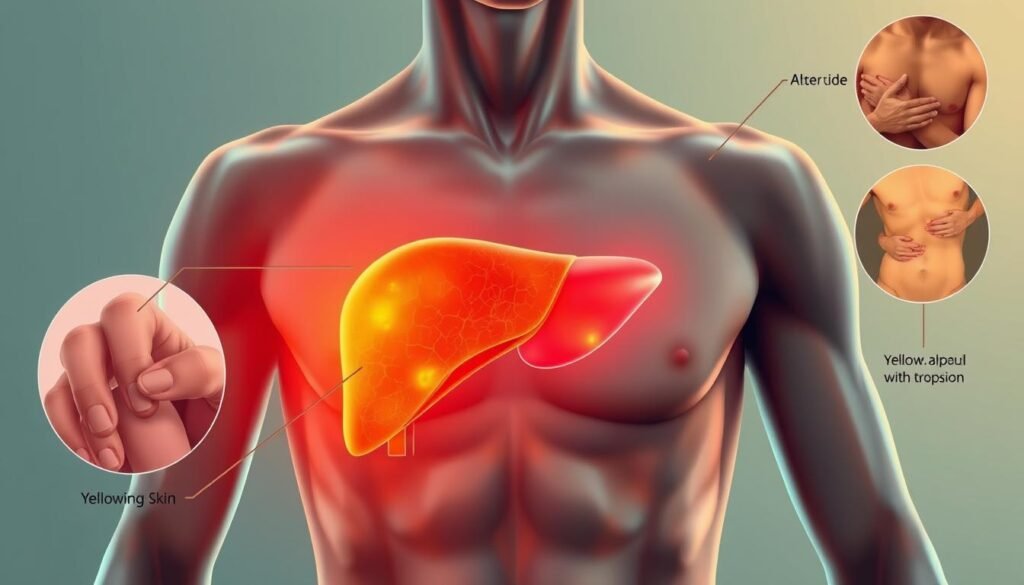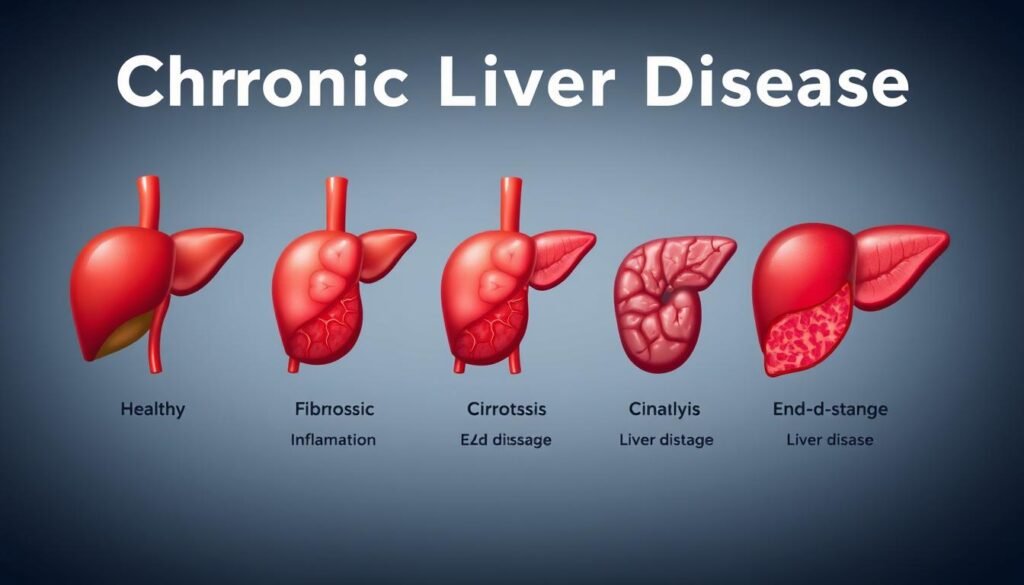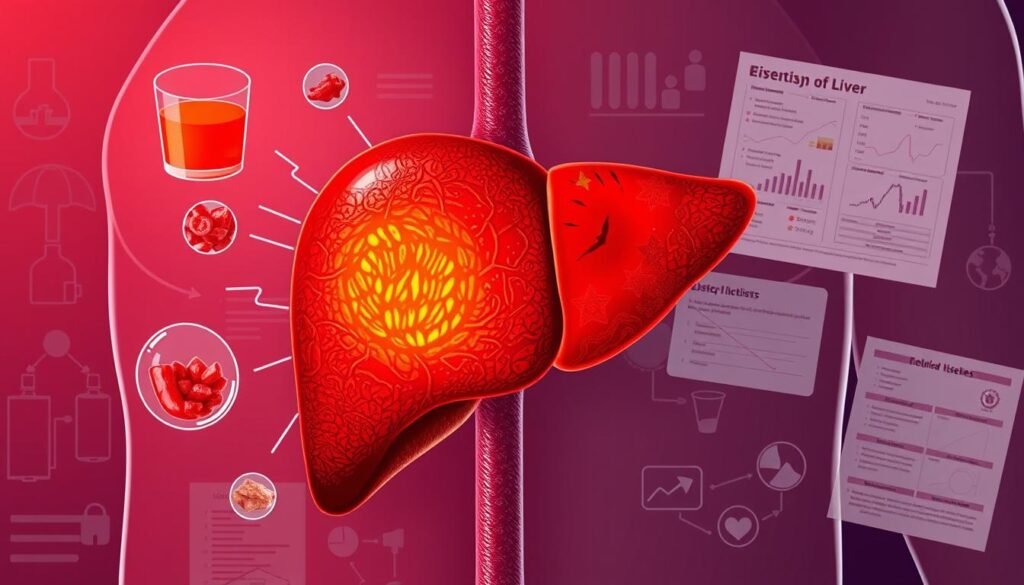Did you know about 5% of people have liver cysts? However, only a few of them show signs like an inflamed liver. This fact underlines how crucial it is to know about liver health. Because liver inflammation, or hepatitis, can stem from many causes and lead to serious outcomes. Spotting the signs and taking care of your liver health is key to stopping liver disease from getting worse.
When the liver gets inflamed, it doesn’t just swell up. It also hints at deeper health problems. These can come from drinking too much alcohol, catching viral infections, or having autoimmune disorders. Knowing the symptoms and handling the treatment options wisely is vital. This helps in keeping your overall health in good shape.
Key Takeaways
- Approximately 5% of the population has liver cysts, with only 5% showing symptoms.
- Liver inflammation can result from various factors, including alcohol and viral infections.
- Chronic inflammation can lead to severe conditions such as cirrhosis and liver failure.
- Diagnosis often involves blood tests, imaging studies, and sometimes liver biopsies.
- Treatment depends on addressing underlying causes and making lifestyle changes.
- Regular check-ups can aid in early detection of liver diseases.
What is an Inflamed Liver?
An inflamed liver is medically called hepatitis. It’s when the liver swells up due to different causes. Some causes can be sudden, while others slowly damage the liver over time. Often, infections like hepatitis A, B, or C make the liver bigger. Steatosis, a fat buildup in the liver, also leads to chronic inflammation. It is linked with obesity and diabetes.
Drinking too much alcohol is a major cause of liver inflammation. Sometimes, liver inflammation happens when cancer spreads there. Autoimmune diseases and certain genetic disorders can also make the liver larger. For example, primary biliary cholangitis or Niemann-Pick disease.
Even though it’s serious, an inflamed liver might not show any signs. That’s why it’s vital to have regular check-ups with a doctor. Doctors may use imaging tests like abdominal ultrasounds or CT scans. They also do blood tests to check how the liver is working.
Symptoms of an Inflamed Liver
Knowing the signs of an inflamed liver is key for your liver’s health. If caught early, liver disease can be addressed quickly. Look for fatigue, abdominal pain, and jaundice, which makes your skin and eyes yellow. These symptoms come from different problems affecting the liver.
Common Signs to Watch For
Some of the signs of liver inflammation include:
- Fatigue and exhaustion
- Abdominal pain, especially in the upper right quadrant
- Jaundice, which can manifest as yellowing of the skin or eyes
- Nausea and vomiting
- A feeling of excessive fullness after meals
It’s important to pay attention to these liver inflammation signs. Noticing them early can help improve the care and results for your liver’s health.
When to Seek Medical Attention
If you have severe abdominal pain, ongoing jaundice, or extreme fatigue, get medical help. A healthcare professional can perform tests to find out what’s causing these symptoms. Early treatment is crucial. Ignoring these signs may worsen liver disease.

Causes of Liver Inflammation
Liver inflammation happens for many reasons, all harmful to your liver. Knowing these causes helps identify risks and symptoms. Key factors are too much alcohol, viral infections, fatty diseases, and autoimmune issues.
Excessive Alcohol Consumption
Drinking too much alcohol seriously risks your liver. It can inflame the liver and lead to major damage if ignored. Look out for symptoms like stomach pain, tiredness, and jaundice. They show your body is fighting the alcohol’s effects.
Viral Infections and Hepatitis
Hepatitis A, B, and C are big reasons for liver inflammation. They spread through dirty water, food, or needles. Each type spreads differently but all hurt your liver. Vaccines and safe habits are key for liver health. Learn more here.
Fatty Liver Diseases
Fatty liver diseases come with too much fat in liver cells. It’s a growing issue in the US, often tied to obesity and metabolic problems. Fat buildup inflames the liver and can lead to fibrosis or cirrhosis. People at risk should watch their lifestyle closely.
Autoimmune Disorders
Autoimmune hepatitis is when the immune system wrongly attacks liver cells. It can happen without warning and usually needs lifelong care. Without treatment, it can badly harm the liver.
Chronic Liver Disease Stages
Chronic liver disease covers a range of conditions that affect liver health. It’s key to understand its stages for prevention and early action. Hepatitis is the start of this disease path. As it worsens, it can cause fibrosis, cirrhosis, and finally liver failure. This is the last stage of chronic liver disease.
Understanding Hepatitis
Hepatitis is when the liver gets inflamed, usually because of viruses like hepatitis B and C. If chronic hepatitis is not managed correctly, it can badly damage the liver. Catching it early matters, because the liver can heal with early treatment. Regular checks can spot hepatitis early to stop more problems.
From Fibrosis to Cirrhosis
Chronic liver disease getting worse leads from hepatitis to fibrosis. This means scar tissue builds up in the liver. Fibrosis shows the liver is still getting damaged. Without stopping it, fibrosis can become cirrhosis. Cirrhosis cannot be fixed and greatly limits liver function. At this point, the liver can’t heal and manage body processes well. This often leads to dangerous health issues.
Recognizing Liver Failure
Liver failure is the worst stage of chronic liver disease, showing the liver can’t do its job. Symptoms are things like confusion, belly swelling, and jaundice. People in this stage are very sick and might need a new liver to live. Without the right care, this stage can be deadly. Knowing these stages helps those at risk or looking to keep their liver healthy.

| Stage | Description | Consequences |
|---|---|---|
| Hepatitis | Initial liver inflammation often caused by virus or toxins | Risk of liver damage; may progress without treatment |
| Fibrosis | Accumulation of scar tissue from prolonged inflammation | Potential progression to cirrhosis if untreated |
| Cirrhosis | Severe scarring of the liver, permanent damage | Drastically impaired liver function; complications likely |
| Liver Failure | End-stage of chronic liver disease with lost liver functions | Potentially life-threatening, may require transplantation |
For more detailed info on liver disease, check out Cleveland Clinic.
Inflamed Liver and Liver Disease
Chronic liver inflammation can lead to serious diseases. Conditions such as cirrhosis come from long-term inflammation. This scarring changes how the liver works and makes it more likely to get sick.
Link Between Inflammation and Cirrhosis
Inflammation is key to developing cirrhosis. It often comes from viruses like hepatitis or from drinking too much alcohol. This ongoing damage causes scar tissue, making the liver function poorly. Over time, this might even cause liver failure and increase the risk of dangerous liver problems.
Potential Complications from Long-Term Inflammation
Long-term inflammation can lead to serious issues like liver cancer. While liver cancer is rare, it’s linked to cirrhosis, so finding it early is vital. Untreated inflammation can lead to decompensated cirrhosis, where the liver can’t do its important jobs. As the liver gets worse, the risk of serious complications goes up, requiring more medical help.

Diagnosis of an Inflamed Liver
When diagnosing an inflamed liver, the first step is a detailed liver examination. Doctors check for an enlarged liver, known as hepatomegaly, using hands-on methods. They feel the liver to gauge its size and feel, hunting for oddities.
Physical Examination Techniques
The physical check-up is key in identifying liver problems. By feeling the belly, doctors can find swelling or pain that hints at liver issues. This method reveals critical information about the liver’s health.
Laboratory Tests for Liver Enzymes
After examining the patient, blood tests check liver enzymes like ALT and AST. High levels of these enzymes mean the liver cells are damaged. A set of liver function tests check different enzyme levels to assess the liver’s condition. Odd results lead to further tests to pinpoint liver diseases. High bilirubin levels indicate a block in bile flow, and low serum albumin suggests poor liver function.
Imaging and Biopsies
Techniques such as ultrasound, CT scans, and MRIs offer clear images of the liver. They’re crucial for spotting structural issues. Sometimes, a liver biopsy is needed to take a closer look at the liver tissue. This step is crucial for a correct diagnosis, understanding the extent of damage, and figuring out treatment. Catching and diagnosing liver issues early is vital for good liver health, as explained in this resource.
Treatment Options for an Inflamed Liver
The best way to tackle an inflamed liver includes different steps. The plan focuses on the root causes of the inflammation. It also aims to keep the liver healthy. Lifestyle changes are key, but sometimes, drugs or surgery are needed too.
Addressing Underlying Causes
Getting to the heart of what’s causing your liver issues is crucial. For example, hepatitis needs antiviral treatment to ease symptoms and limit damage. Autoimmune hepatitis may require drugs to calm the immune system. Catching these problems early can stop disease progression and boost liver health.
Lifestyle Modifications for Liver Health
Making changes in your life is important for better liver health. Important steps include:
- Maintaining a healthy weight: Being overweight is bad for your liver, leading to fatty liver disease.
- Minimizing alcohol consumption: Drinking less is critical, as too much alcohol causes liver issues and cirrhosis.
- Engaging in regular exercise: Staying active supports your overall and liver health.
- Managing chronic conditions: Keeping conditions like diabetes in check is vital for a healthy liver.
Medications and Surgical Interventions
Along with lifestyle changes, some may need medication or surgery. Available treatments include:
| Treatment Type | Description |
|---|---|
| Liver Medications | Drugs are used for managing hepatitis or autoimmune hepatitis. |
| Surgical Treatments | Operations can remove benign liver cysts or fix severe liver damage issues. |
| Liver Dialysis | This helps those with serious liver disease by supporting liver functions. |
Managing Liver Health
Keeping an eye on your liver health is key. If you’re at risk for liver disease, getting checked regularly is a big help. It catches problems early so you can act fast. This stops liver disease from getting worse and keeps you healthy.
Importance of Regular Check-Ups
Getting your liver checked often is super important. Doctors use blood tests and scans to find any issues. They can then tell you if you need to change your lifestyle or start treatments. This helps tackle problems like too much drinking or being overweight. It makes you aim for a healthier life.
Preventative Measures for Liver Conditions
To stop liver disease, there are a few key steps. For starters, get vaccinated against hepatitis A and B, especially if you’re already at risk. Eat well and drink alcohol in moderation. Regular exercise and avoiding risky behaviors also help keep your liver safe.
By doing these things, your liver works better, and so does the rest of your body. If you want to know more about what to eat for a happy liver, check out this resource.
| Preventative Measure | Description |
|---|---|
| Regular Medical Check-Ups | Routine evaluations help in early detection of liver issues. |
| Vaccination | Immunization against hepatitis viruses to prevent infections. |
| Balanced Diet | Consuming whole foods rich in antioxidants and avoiding processed items. |
| Moderate Alcohol Intake | Limiting alcohol consumption to recommended levels for both men and women. |
| Healthy Lifestyle | Maintaining a proper BMI and engaging in regular physical activity. |
| Avoiding High-Risk Behaviors | Limiting behaviors associated with increased risk of viral hepatitis. |
Conclusion
Knowing how to deal with a swollen liver is key for keeping it healthy. Conditions like non-alcoholic fatty liver disease (NAFLD) hit more than 30% of people in the West. So, spotting liver problems early can really help prevent bigger issues, like cirrhosis and liver failure.
It’s very important to get regular check-ups and live healthily to lower the risk of liver diseases. Being overweight, eating too much fat, and metabolic syndrome play a big role in NAFLD. Learning more, especially from sites like Beyouthfulyou, is key to taking good care of your liver.
Aiming for a healthy liver means eating right, staying active, and keeping an eye on your health. Knowing what causes liver problems and dealing with them can help keep your liver disease-free. This ensures a healthier life ahead.